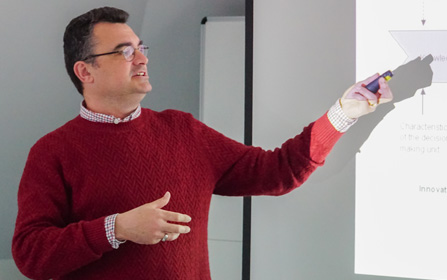Main Content
Coworking in the Countryside? IRS Seminar on the Diffusion of Innovative Work Practices

Coworking spaces, maker spaces and other kinds of "labs" are typically seen as an urban phenomenon. Indeed, most of them are located in larger cities. However, they also exist in the countryside, and as an element in a comprehensive strategy, they could potentially help stabilizing rural areas suffering from demographic and economic decline. During an IRS seminar on March 19th 2019, Ignasi Capdevila from PSB Paris School of Business presented the case of a rural coworking initiative from the Spanish region of Catalonia.
For about ten years a growing research community has studied new places of work and collaboration as well as experimentation, for which the term 'labs' has established as a roof category. In numbers, coworking spaces are the largest group of these labs. They offer attractive environments and infrastructures for temporary work which are used by freelancers and increasingly companies. In addition, many coworking spaces follow the aim of stimulating creative interactions between their users and thus innovation. Recent studies, however, have concluded that coworking spaces first and foremost are places of work, whose effectiveness as generators of innovation is limited. Ignasi Capdevila, associate professor at PSB Paris School of Business has helped build the field of lab research. Since 2015, the research department "Dynamics of Economic Spaces" at IRS has contributed to the field in one basic research "lead project" and one applied project funded by the German Ministry for Education and Research (BMBF).
Yet, coworking in itself can be considered an innovation – a new way of organizing work. Today, coworking spaces constitute an essential infrastructure, particularly for freelancers in creative and digital economies. More recently the question has arisen which role coworking can play in stabilizing rural areas which are struck by a population exodus to the cities. Companies in the digital and creative economy are rare in rural areas. Villages and rural owns lack favorable conditions for freelance work involving digital media. Broadband connectivity tends to be worse than in urban agglomerations and there is a lack of well equipped, attractive work environments which support networking and flexible collaboration. Who wants to work in the said fields, is often forced to move to the city. Is rural coworking the answer to this conundrum?
During an IRS seminar on March 19 2019, Ignasi Capdevila, associate professor at PSB Paris School of Business, presented a study on a coworking initiative in the rural areas of Catalonia and discussed his findings with IRS researchers. Capdevila belongs to a circle of international researchers and experts who have been in close and regular exchange with the research department since inception of its lab research.
The Catalan metropolis Barcelona established itself very early on as a location for innovative forms and places of work – partially as a strategy to deal structural change in its economy. Therefore, much like in Berlin, coworking spaces are a common sight in Barcelona. Coworking spaces in Catalonia, most of them in Barcelona, are organized in the network "Cowocat" (full name: Associació Coworking de Catalunya Cowocat), which is publicly funded. In 2012 the first coworking space in rural Catalonia was established. In 2014 the project "Cowocat_rural" was initiated with several aims in mind: building a network of rural coworking spaces in Catalonia, raising awareness and acceptance of coworking and, in doing so, countering the loss of talent in rural areas. The initiative was funded jointly by the economic development agencies of the participating counties.
In his study, Capdevila looked at the initiative through the lens of "innovation diffusion", that is, the question how innovations (such as the relatively new practice of coworking) spread. The classic theory of diffusion states that an innovation, once in the world, is gradually perceived as useful and thus implemented by more and more actors ("adopters"), some earlier, some later. However, using the example of rural coworking, he could show that a different theory, that of "translation", matches reality better. According to translation theory, en innovation does not stay the same when it spreads, and neither is it "adopted" in a passive manner. Instead, it has to adapt to new environments. It is changed substantially and, in a way, recreated over and over again. The "adopters" in truth are highly active and creative agents.
Regarding Cowocat_rural this means, for instance: Creating a coworking space in a rural area – 14 of them were newly established in the course of the project – does not primarily mean to shape a place, but to shape a community. In Cowocat_rural "animators" played a central role: People who, themselves coworkers, build networks, spread the idea of coworking and persuade potential users. While in larger cities the need and demand for coworking is clearly articulated and commonly known, in a rural context the primary challenge was to build a common understanding of the nature, meaning and use of coworking. Establishing a concrete coworking space, for instance by refurbishing and reusing an existent building, came later and – counter to the experience in big cities – was usually not much of a challenge. A bigger challenge, however, was presented by the larger distances in rural areas. Organizing co-presence in one place turned out to be more difficult than in the city and overall was more time and resource consuming in rural compared to urban coworking. Finally, the target groups of rural coworking turned out to differ from the urban model, too: In addition to the known user groups such as freelancers and creatives, returnees to the countryside, students, unemployed people, tourists and more traditional teleworkers appeared as users, all exerting specific needs and demands.
Ignasi Capdevila’s findings resonate with research conducted at IRS – on the phenomenon of coworking, but also on the emergence of innovations in rural areas. Both emphasize the importance of local context and the engagement of local "key players". For practitioners the implications are: You cannot simply copy success stories. A practice such as coworking, if it is to move from one spatial context to another, must be re-assembled in a fundamentally new way.


